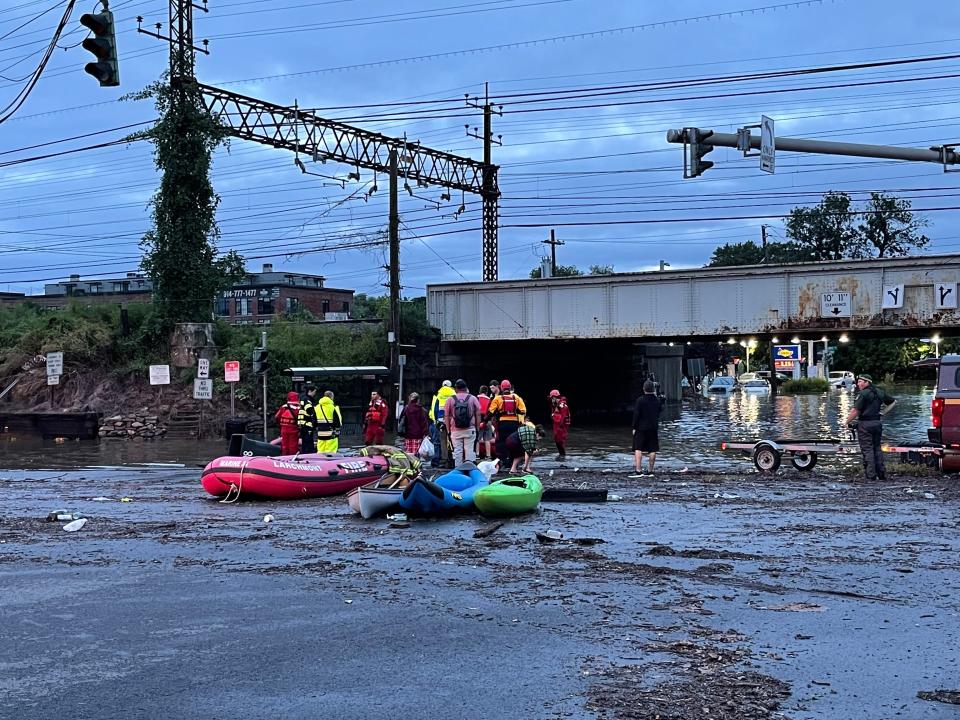New York renters to get flood risk disclosures for properties with climate change
Landlords will now have to disclose flood risks to renters under a new New York law.
On Friday, Gov. Kathy Hochul signed the bill that comes in response to increasing floods due to the effects of climate change. Every New York county has declared a flood disaster declaration in the last decade, said Assemblymember Robert Carroll, D-Brooklyn, the bill author, in a news release.
“As flooding becomes more frequent and intense due to climate change, we must make sure New Yorkers have the information they need so that they can protect their property and their families,” he said in a statement. “New York State has lagged behind other states when it comes to flood risk foreclosure for tenants and this legislation is an important step forward.”
In 2021, the remnants of Hurricane Ida flooded large swaths of downstate, displacing scores of residents and killing 17 people, many inside basement apartments. Ida caused between $7.5 and $9 billion in damages across New York, a National Hurricane Center report said.
Rising waters:Hurricane Ida’s deluge nearly drowned him in his NY apartment. He can’t afford to leave.

New York lagged behind other states in covering prospective tenants with flood risk. The Natural Resources Defense Council, an environmental advocacy nonprofit, gave New York a failing grade in its tracker of state laws across the country. Several southern states that have seen increasing floods from storms, such as Texas, Louisiana and Mississippi, have taken action.
“As climate change is causing storms to be more severe, every New Yorker deserves to know if they are at risk of getting flooded,” Joel Scata, a senior attorney at the NRDC, said in a statement. “With this law, renters will get the flooding history of their property so they can prepare.”
The new law, which takes effect in June, requires residential leases to notify prior flood history and current risk of leased premises. This includes disclosing whether the unit is located wholly or partially in a Federal Emergency Management Agency-designated floodplain, as well as 100-year and 500-year floodplains, per FEMA Flood Insurance Rate Maps.
Additionally, property owners must include information about whether the leased property has experienced flood damage due to a natural event that included heavy rainfall, coastal storm surge, tidal inundation or river overflow.
Meanwhile, the law requires a lease to notify tenants about FEMA’s National Flood Insurance Program to cover “personal property and contents” damaged by the flood. “A standard renter’s insurance policy does not typically cover flood damage,” the law requires leases to say, adding it encourages renters to examine their policies' coverage.
Climate effects:New York tenants could soon find out if their homes have flood history. What to know
In August, Westchester County’s similar law took effect for commercial and residential tenants notifying them about FEMA flood hazard areas and with flooding going back a decade. The county and state laws apply to new leases, and they both provide a legal recourse if landlords don’t disclose risks.
New York and Westchester’s laws largely overlap, said Tim Foley, CEO and executive vice president of the Building and Realty Institute of Westchester and the Mid-Hudson Region, a trade association for property owners. However, Foley worried about existing gaps in property sales.
Before Hochul signed the new law, state law only required property sellers to disclose whether a property sat within a floodplain, and if flooding yielded standing water in the area. Those who sold a property often bypassed it by giving a $500 credit to the buyer.
If a person now buys a property, Foley said, the seller doesn’t have to disclose past flooding incidents. However, the buyer could still be liable for failing to disclose past instances of flooding that predated them.

Hurricane Ida's recovery:A year after Ida, NY outlines how it'll spend $41M on recovery. Where will the money go?
“It remains a loophole even with the passage of the state bill,” he said.
Cortney Koenig Worrall, president and CEO of the New York City nonprofit Waterfront Alliance, said it’s a significant measure for climate protection to renters.
The next step is full disclosure for home purchases, he added. Scata, of the NRDC, and Foley, of the institute, agreed.
“Every New Yorker deserves to know the potential costs and risks with flooding when deciding where to call home,” he said.
Eduardo Cuevas covers race and justice for the USA TODAY Network of New York. He can be reached at EMCuevas1@gannett.com and followed on Twitter @eduardomcuevas.
This article originally appeared on New York State Team: NY renters get flood disclosure law aimed at climate change effects

